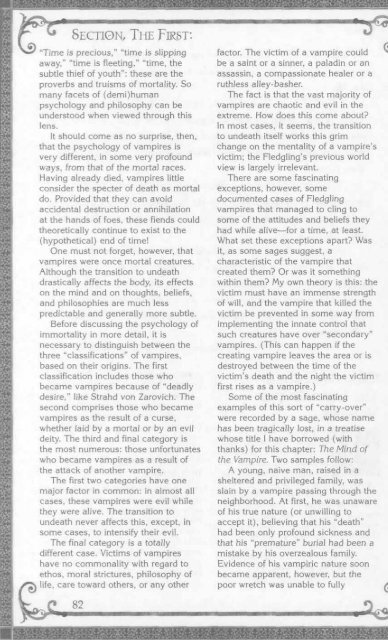Van Richten's Monster Hunter's.pdf - Askadesign.com
Van Richten's Monster Hunter's.pdf - Askadesign.com
Van Richten's Monster Hunter's.pdf - Askadesign.com
Create successful ePaper yourself
Turn your PDF publications into a flip-book with our unique Google optimized e-Paper software.
-’ SLCTION, THE FK~T:<br />
“Time is precious,” “time is slipping<br />
away,” “time is fleeting,” “time, the<br />
subtle thief of youth: these are the<br />
proverbs and truisms of mortality. So<br />
many facets of (demi)human<br />
psychology and philosophy can be<br />
understood when viewed through this<br />
lens.<br />
It should <strong>com</strong>e as no surprise, then,<br />
that the psychology of vampires is<br />
very different, in some very profound<br />
ways, from that of the mortal races.<br />
Having already died, vampires little<br />
consider the specter of death as mortal<br />
do. Provided that they can avoid<br />
accidental destruction or annihilation<br />
at the hands of foes, these fiends could<br />
theoretically continue to exist to the<br />
(hypothetical) end of time!<br />
One must not forget, however, that<br />
vampires were once mortal creatures.<br />
Although the transition to undeath<br />
drastically affects the body, its effects<br />
on the mind and on thoughts, beliefs,<br />
and philosophies are much less<br />
predictable and generally more subtle.<br />
Before discussing the psychology of<br />
immortality in more detail, it is<br />
necessary to distinguish between the<br />
three “classifications” of vampires,<br />
based on their origins. The first<br />
classification includes those who<br />
became vampires because of “deadly<br />
desire,” like Strahd von Zarovich. The<br />
second <strong>com</strong>prises those who became<br />
vampires as the result of a curse,<br />
whether laid by a mortal or by an evil<br />
deity. The third and final category is<br />
the most numerous: those unfortunates<br />
who became vampires as a result of<br />
the attack of another vampire.<br />
The first two categories have one<br />
major factor in <strong>com</strong>mon: in almost all<br />
cases, these vampires were evil while<br />
they were alive. The transition to<br />
undeath never affects this, except, in<br />
some cases, to intensify their evil.<br />
The final category is a totally<br />
different case. Victims of vampires<br />
have no <strong>com</strong>monality with regard to<br />
ethos, moral strictures, philosophy of<br />
0 life, care toward others, or any other<br />
factor. The victim of a vampire could<br />
be a saint or a sinner, a paladin or an<br />
assassin, a <strong>com</strong>passionate healer or a<br />
ruthless alley-basher.<br />
The fact is that the vast majority of<br />
vampires are chaotic and evil in the<br />
extreme. How does this <strong>com</strong>e about?<br />
In most cases, it seems, the transition<br />
to undeath itself works this grim<br />
change on the mentality of a vampire’s<br />
victim: the Fledgling’s previous world<br />
view is largely irrelevant.<br />
There are some fascinating<br />
exceptions, however, some<br />
documented cases of Fledgling<br />
vampires that managed to cling to<br />
some of the attitudes and beliefs they<br />
had while alive-for a time, at least.<br />
What set these exceptions apart? Was<br />
it, as some sages suggest, a<br />
characteristic of the vampire that<br />
created them? Or was it something<br />
within them? My own theory is this: the<br />
victim must have an immense strength<br />
of will, and the vampire that killed the<br />
victim be prevented in some way from<br />
implementing the innate control that<br />
such creatures have over “secondary”<br />
vampires. (This can happen if the<br />
creating vampire leaves the area or is<br />
destroyed between the time of the<br />
victim’s death and the night the victim<br />
first rises as a vampire.)<br />
Some of the most fascinating<br />
examples of this sort of “carry-over”<br />
were recorded by a sage, whose name<br />
has been tragically lost, in a treatise<br />
whose title I have borrowed (with<br />
thanks) for this chapter: The Mind of<br />
the Vampire. Two samples follow:<br />
A young, naive man, raised in a<br />
sheltered and privileged family, was<br />
slain by a vampire passing through the<br />
neighborhood. At first, he was unaware<br />
of his true nature (or unwilling to<br />
accept it), believing that his “death<br />
had been only profound sickness and<br />
that his “premature” burial had been a<br />
mistake by his overzealous family.<br />
Evidence of his vampiric nature soon<br />
became apparent, however, but the<br />
poor wretch was unable to fully


